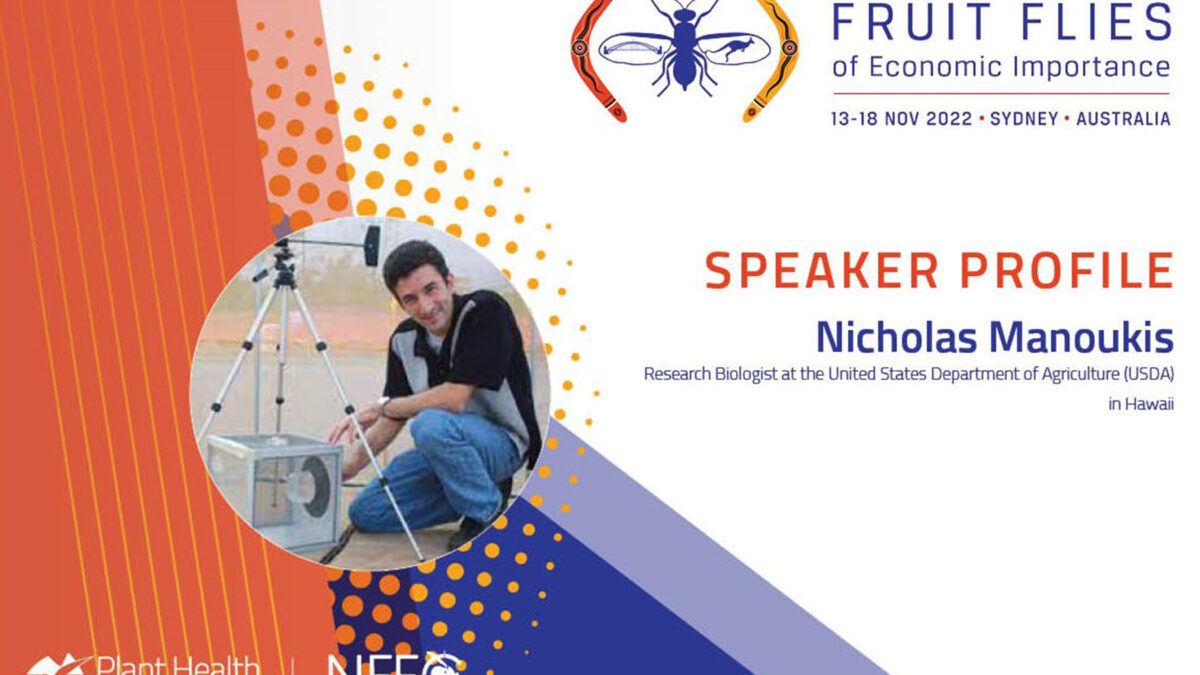11ISFFEI Speaker profile: Dr Nicholas Manoukis
One of the speakers at the upcoming 11th International Symposium on Fruit Flies of Economic Importance (ISFFEI) is Dr Nicholas Manoukis, supervisory research biologist with the Agricultural Research Service (ARS), the agency responsible for intramural research in the U.S. Department of Agriculture (USDA), who will present ‘An efficient method to test screens for use in augmentoria applied to Bactrocera oleae, Ceratitis capitata, and two parasitoid wasp species’.
Dr Manoukis heads up the Tropical Crop and Commodity Protection Research Unit (TCCPRU) at the Daniel K. Inouye U.S. Pacific Basin Agricultural Research Center (DKI-PBARC) in Hilo, Hawaii.
His work focusses on tropical pests and invasive insects, particularly fruit flies, especially seeking ways to mitigate their impact or prevent their establishment. Prior to working at ARS he spent almost a decade studying the ecology, evolution and behaviour of the malaria vector Anopheles gambiae in Mali, West Africa.
“My studies on mosquitoes included computer simulations of the spread of transgenes introduced for malaria control, a test of a speciation hypothesis, 3D computer-vision based analysis of swarms and mating within them, the ecology of malaria transmission and GIS-based models for predicting vector pressure,” he said.
Dr Manoukis’ research program currently includes computer modelling of invasive pests, improvements to Sterile Insect Technique (SIT) and Male Annihilation Technique (MAT), computer-vision analysis of fruit fly responses to lures, tracking the movement of individual fruit flies, developing mobile apps for decision support, and biological control. It comprises two disparate but complementary components: 1) Computer modelling and simulation and 2) Field experiments, often with the application of novel sensing or computer-assisted approaches.
“I aim to address questions that are important to agriculture and the ecological systems that produce our food. We all need to eat, preferably three times per day, but an important challenge in the 21st century is to improve the food production systems we all depend on by reducing chemical use, increasing production, efficiency and enhancing environmental sustainability,” he said.
“This includes guarding against invasive pest insects that threaten all the above aspects of agriculture, as well as mitigating their impacts. My work directly addresses these needs from both practical and applied perspectives.”
Two of the projects that Dr Manoukis are involved in, 1) improving surveillance and other trapping networks, and 2) modelling extirpation of invasive fruit flies, aim to enhance plant biosecurity.
“These projects focus on reducing the probability for invasive tephritids to establish in a pest-free area,” he said.
He will share other projects, such as the augmentorium research, which focuses on better control of existing fruit fly populations at the Symposium.
“The augmentorium is a great example of a technique that can be integrated into an IPM program, no chemical inputs, but it can enhance the effectiveness of biological control,” he said.
